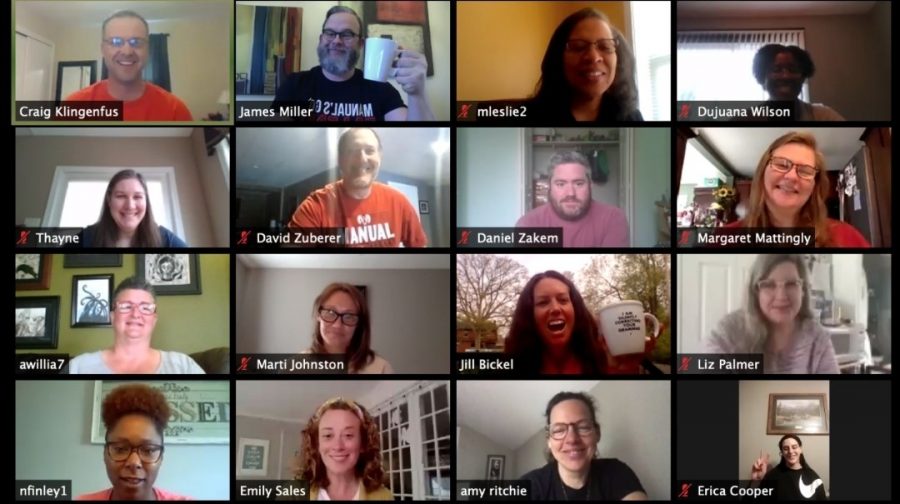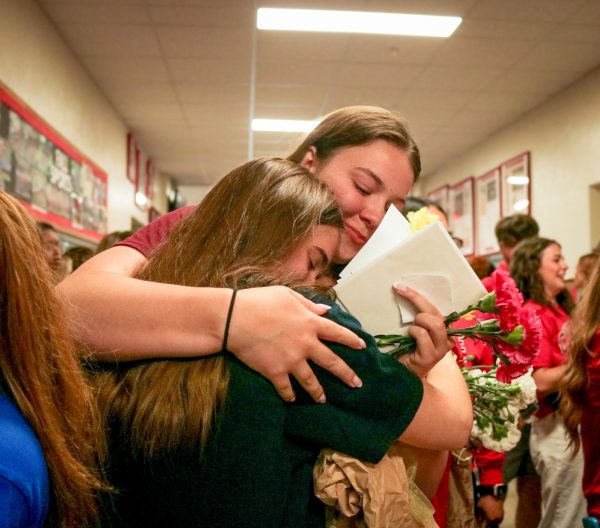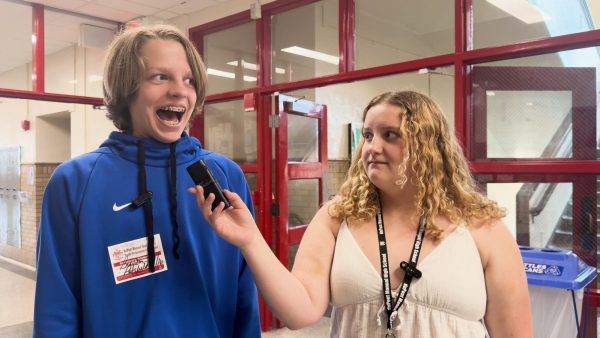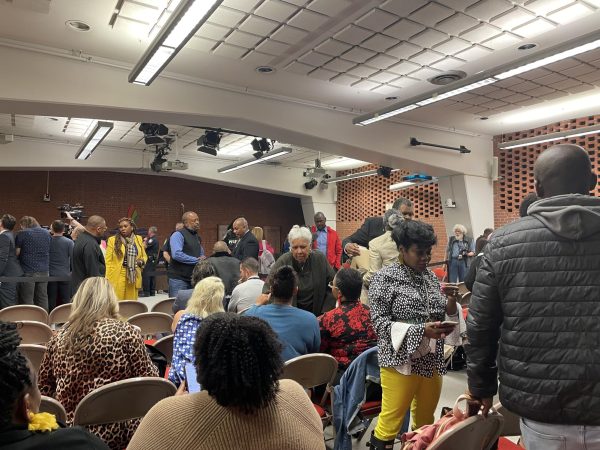Teachers come together to care for students
Manual’s faculty began working yesterday, April 6, to prepare for Non-Traditional Instruction. Photo courtesy of @duPontManual on Twitter.
April 7, 2020
Non-Traditional Instruction (NTI) began across JCPS today, and because of COVID-19, everyone’s daily routine seems different. Teachers are no exception.
Whether it’s the unfamiliarity with online software necessary to teach students at home, from home, or the flexibility students and teachers both need during the global pandemic, NTI is a unique experience that will require teachers to think differently about instruction.
Gold day Zoom meetings! We are NTI ready! #RamsOnaRampage pic.twitter.com/gupaiCGylN
— duPont Manual HS (@duPontManual) April 7, 2020
For many Manual teachers, the transition from in-person to online instruction has been challenging and a learning opportunity for out-of-the-box teaching.
“Overall, I’m going into this endeavor as an optimist and view it as an opportunity to learn some new ways of communicating and teaching and learning. After all, how can I expect my students to be positive and open-minded if I’m cynical and stressed,” Ms. Jill Bickel (English) said.
“My main objective Is to take advantage of this opportunity to encourage students to look closely at themselves and their immediate surroundings to find the joyful simplicity that exists at and just beyond our fingertips,” Mr. Wes Curtis (Visual Arts) said. “It is as simple as paying a little more attention to the sound of the birds that greet us every morning, to examine the way light falling on trees and homes nearby changes and emphasizes things to which we may have never really paid attention.”
According to JCPS Assistant Superintendent Christy Rogers, one challenge that schools across the district, and especially at Manual, will need to overcome is the common problem of underestimating the time it will take students to complete assignments at home.
“In many households, siblings are sharing one laptop, no technology or limited internet access,” Rogers said. “NTI poses a new dynamic in that the parent is now working from home and the entire family may need to share the computer.”
The Kentucky Department of Education also reiterated this message, suggesting that many schools have yet to perfect their NTI plans during this global pandemic.
“Many school districts across our state have had a ‘NTI’ plan in place for snow days for quite some time. The snow day plans work well for one or two days, but no one has really built a snow plan or NTI plan for 5 to 6 weeks of instruction,” Rogers said. “We wanted to ensure we built plans that were academically engaging, aligned to standards, yet flexible and reasonable considering the enormous challenges all families are facing in this pandemic.”
4/ you will ultimately assign too much in the beginning & learn from it. We all did. If your admin requires more than u or stdnts can do, speak with them. They r learning too. Stdnts r on their own as parents are working even from home. This isn’t homeschooling. It’s survival.
— Allison Slone (@joallison_slone) April 6, 2020
Despite the challenge, teachers seem to be optimistic about what this experience can teach them and their students. It’s a new experience for everyone involved, and part of the takeaway is the importance of adjustability and flexibility, while still being supportive of their students in their day-to-day lives.
“At the beginning of each of my regular classes, we have a couple of minutes in which students share what is going on in their lives. I’m hoping to continue this through Google Classroom,” Ms. Cynthia Shiroma (Foreign Language) said. “ Of course, as this is all pretty new. I’m prepared to throw out whatever isn’t working and try something new. It should be easy to tell when things flop.”
“The silver lining of all of this is that we can do education just for education’s sake,” Mrs. Alexis Rich (Science) said. “All the messy stuff has gone away. I don’t have to mark tardies, I don’t have to worry about any discipline problems. All the good stuff of school is right here, and to have that positive relationship with my kids and not have to worry so much about grades, I don’t see how we lose.”
NTI will certainly provide opportunities for teachers to rethink the education system. Since classes are typically structured with as many as 30 students per block during any given school day, the online approach will allow individual focus, attention and coaching. This is especially true for YPAS teachers.
“I’m using this NTI phase to shift my focus to solo guitar playing for my students,” Mr. Michael Kagan (YPAS) said. “All of us teachers are tasked to find opportunity out of circumstance and though, as a musician, there’s a lot of value in playing in an ensemble, there is a truth to the strength of our ensemble having its source in the strength of the individuals.”
“I look at this as an opportunity for me to get to know my individual student’s work even more than I already do as it is difficult to hear each student perform or demonstrate individually often enough in large classes with a busy performance calendar,” Mr. Jacob Cook (YPAS) said. “I look forward to hearing my students’ work and seeing them grow as individual musicians during this period of NTI without the pressure of preparing for performance or our typically busy schedules.”
Some teachers already relied on technology to facilitate significant parts of learning within their classrooms, and they are walking into NTI with experience that will hopefully assist them in providing NTI. Even so, shifting entirely online is still a transition that will require flexibility.
“Although I have used a lot of technology and online methods in the past, I have never relied on that as the only form of instruction. It is going to be a learning process for everyone and the key words are simple, flexible and persistent,” Mr. David Richards (Math) said.
Other teachers have challenges of their own and are able to empathize with students in similar situations. Students and teachers might be responsible for child-care, have limited access to technology, have other jobs or be caring for someone ill.
“I have my own challenges like many teachers. I will be balancing watching my 7-year-old nephew each weekday with doing my teaching job just as many teachers will be doing with their own children. I have academic time with him twice a day to ensure he is ready for 2nd grade as well as feeding him lunch, offering some creative time, and making sure he gets exercise and play time,” Ms. Alesia Williams (English) said.
It’s easy to forget that teachers are people too, with lives similar to those of their students. Sometimes, their lives serve as the most qualifying experience one could have for online instruction.
“My own kids started NTI yesterday, so I’m learning what not to do from my seniors’ complaints,” Ms. Thayne Bruszewski (English) said.
“I am so very much not an online learner that the whole thing is a bit out of my comfort zone and beyond my preferences at all. I took an online class a couple of years ago and hated it. I mean like really dreaded it because it felt so impersonal and blah to me as a student. But I love teaching” Ms. Becky Slagle (English) said.
Because of the challenges, teachers are learning the importance of flexibility now more than ever. They’re taking into account student concerns and balancing them with their personal lives while still trying to ensure students receive a quality education that will prepare them beyond high school.
“I have already reached out to see what kinds of technology limitations they have and am developing flexible assignments that will allow everyone to get something good out of this,” Ms. Belinda Hafell (Science) said. “As most of my students will eventually be going on to college, I owe it to them to give them an opportunity to gain experience in important topics such as molecular genetics, genomics and biotechnology.”
“I’m making some of it up as I go with feedback from kids. You guys are what’s important. That’s my focus — what do these seniors need?” Mr. Michael Crain (English) said.
For one of the first times, if not the only time, education appears to be forming around teacher and student lives, rather than lives forming around the daily 7:40 to 2:20 obligation. This isn’t unique to schools, however, as many businesses have closed, jobs lost and people find themselves around family much more than they might have been in the past.
“NTI will be a challenge to all teachers because it is very different from our normal daily operations. I think it provides some interesting possibilities, and students will benefit from this time as working in an asynchronous manner will prepare them for what they will likely encounter beyond graduation,” Mr. Cook said.
Many teachers are worried about the loss of in-person interaction that they had with the students. They are concerned that this lack of required daily face-to-face interaction could be detrimental to students’ health as well as their ability to focus on school work.
“I was most concerned about every one of my students knowing that they weren’t just floating out there all alone. I am big on making sure everyone feels like they matter at school and in class, and beyond school some people get lost or fade away from the group experience,” Ms. Slagle said.
“My first priority is to help seniors feel like they are connected in some small way,” Mr. Crain said. “I want to keep students engaged with one another and some type of creative and intellectual work or life outside our situation. I think I see my role as someone that helps reinforce what we’ve learned, but provide new opportunities to apply it.”
For many teachers, this unexpected period of time away from their students is also starting to cause their own reflections on the positive moments they’ve had with their students while facing the real chance that they might have seen their seniors—in person—for one of the last times.
“I have uploaded some art related YouTube videos and asked students to upload selfies outside, with their pets or with their art – just to check in,” Ms. Alana Alford (VA) said. “It’s been nice to see their faces and interact with them. We miss our students so much, and we miss our dear Manual VA!”
Above all else, it’s clear that teachers care about their students and are willing to adapt their instruction to accommodate students’ needs during these times.
“I love teaching, I love my students, so I guess I’ll take the high road and do whatever I need to do to make this all work with a goal of making it as personal, as interesting, and as effective as it can be,” Ms. Slagle said. “And if I realize some people can’t access me online, I am happy to send them mail. I make a great penpal!”
“It’s a difficult time, but with everyone working together, I know we will get through this, and the students will continue to learn and grow,“ Mr. Tim Murner (YPAS) said.
They haven’t given up, though. Teachers still plan to provide instruction to students as best as they possibly can, while recognizing that this is a difficult and unique situation for everyone. Being human alongside their students, in a time like this, seems to surpass their occupation.
“While I’m having to cut content down to the most essential pieces, I also want to help my students continue to learn and grow. I miss them every day, and I know we’re all looking forward to being back in school together,” Ms. Nicole White (Math) said. “The most important part, however, is meeting kids where they are with compassion and enjoying our opportunity to learn in a new way.”
Learning in a new way will soon become the normal way of learning as NTI continues. While things such as grades and assessments might be uncertain for now, the district’s goal is to ensure that no one is negatively impacted by the transition to NTI.
“A lot of the grading process is poorly defined because of the strange circumstances, so our grading policy is subject to change,” Mr. Jacob Jury (Math) said.
For everyone, though, this will be a time to learn, grow and experience something incredibly unique.
“I must admit this is such a stretch for my comfort zone. The technology isn’t the issue as much as my discomfort being on camera,” Ms. Cyndi Young (VA) said. “Alas, an opportunity to grow myself.”
Families that find themselves stressed out, overwhelmed, confused or even uncomfortable with NTI, don’t worry, your teachers are too. More importantly, though, your teachers miss you and care about you. And in the end, we will all get through this — together.



















